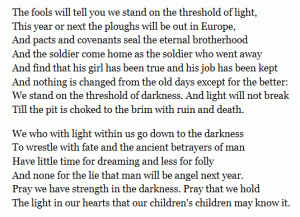Warrigal
SF VIP
- Location
- Sydney, Australia
I was watching an episode of Doctor Who last night and it featured a line "Demons run when a good man goes to war".
I looked it up and found this poem:
It would appear that it was written specifically for Doctor Who but I can't help feeling that it has a wider application to the concept of war itself, and what it costs morally, even when the cause is just.
I'm opening up this topic in the hope that people might post some of the deeper poems relating to war and provide others with some discussion material.
Poetry has never been my long suit but I will try to give my personal interpretation of this poem.
I have never personally experienced war. I was born in 1943 in the middle of a big one but home in Australia I was cocooned from the horrors. My dad served in New Guinea and came home again but two of his brothers lie in war cemeteries overseas. Before them their father served in the Boer War and WW I and their grandfather sailed in the Royal Navy in a fully rigged ship.
Since then, no-one in my line has ever gone to war. I used to worry that my son might be conscripted or volunteer for military service, not so much because I was afraid of him being killed but because I dreaded what the experience might do to his inner self - his mind and his very soul.
All of the men I have referred to were/are "good men". I see the child that is lost as the innocence that good people have at their core and the night and darkness might be the dark despair and mental anguish that enters when innocence is lost.
I also interpret the poem as saying that only goodness can conquer evil, despite the terrible cost.
This topic is now wide open. All thoughts are eagerly anticipated.
I looked it up and found this poem:
“Demons run when a good man goes to war
Night will fall and drown the sun
When a good man goes to war
Friendship dies and true love lies
Night will fall and the dark will rise
When a good man goes to war
Demons run, but count the cost
The battle's won, but the child is lost”
― Steven Moffat
It would appear that it was written specifically for Doctor Who but I can't help feeling that it has a wider application to the concept of war itself, and what it costs morally, even when the cause is just.
I'm opening up this topic in the hope that people might post some of the deeper poems relating to war and provide others with some discussion material.
Poetry has never been my long suit but I will try to give my personal interpretation of this poem.
I have never personally experienced war. I was born in 1943 in the middle of a big one but home in Australia I was cocooned from the horrors. My dad served in New Guinea and came home again but two of his brothers lie in war cemeteries overseas. Before them their father served in the Boer War and WW I and their grandfather sailed in the Royal Navy in a fully rigged ship.
Since then, no-one in my line has ever gone to war. I used to worry that my son might be conscripted or volunteer for military service, not so much because I was afraid of him being killed but because I dreaded what the experience might do to his inner self - his mind and his very soul.
All of the men I have referred to were/are "good men". I see the child that is lost as the innocence that good people have at their core and the night and darkness might be the dark despair and mental anguish that enters when innocence is lost.
I also interpret the poem as saying that only goodness can conquer evil, despite the terrible cost.
This topic is now wide open. All thoughts are eagerly anticipated.


